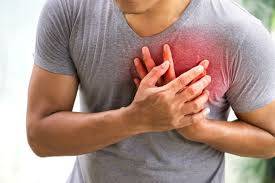Certainly, let's break down heart attacks into their causes, signs, effects, and solutions.
**Causes of Heart Attack:**
1. Coronary artery disease (atherosclerosis)
2. High blood pressure (hypertension)
3. High cholesterol levels
4. Smoking
5. Diabetes
6. Obesity
7. Sedentary lifestyle
8. Family history of heart disease
9. Age (risk increases with age)
10. Gender (men are at higher risk)
11. Stress
12. Excessive alcohol consumption
13. Illicit drug use, such as cocaine
14. Poor diet (high in saturated fats and sugars)
15. Previous heart attack or heart disease
16. Inflammatory conditions (e.g., rheumatoid arthritis)
17. Chronic kidney disease
18. Air pollution and environmental factors
19. Sleep apnea
20. Genetic factors
**Signs and Symptoms of a Heart Attack:**
1. Chest pain or discomfort (often described as pressure, squeezing, or burning)
2. Pain radiating to the arms, neck, jaw, or back
3. Shortness of breath
4. Cold sweats
5. Nausea or vomiting
6. Lightheadedness or fainting
7. Fatigue
8. Indigestion or heartburn-like symptoms
9. Anxiety or a sense of impending doom
10. Pain or discomfort in the shoulder blades
11. Palpitations
12. Cough
13. Swelling in the legs, ankles, and feet
14. Weakness
15. Clammy skin
16. Cyanosis (bluish skin or lips)
17. Silent heart attack (no symptoms but detected through tests)
18. Women may experience different symptoms, such as unusual fatigue, dizziness, or pain in the lower chest or upper abdomen.
**Effects of a Heart Attack:**
1. Damage to the heart muscle
2. Heart failure
3. Irregular heartbeats (arrhythmias)
4. Cardiogenic shock
5. Reduced heart function
6. Reduced exercise capacity
7. Increased risk of future heart attacks
8. Stroke
9. Damage to heart valves
10. Mental health issues (anxiety, depression)
11. Decreased quality of life
12. Fatigue and weakness
13. Reduced kidney function
14. Reduced sexual function
15. Increased healthcare costs
16. Impact on daily activities and work
17. Lifestyle changes
18. Medication side effects
19. Potential complications from medical procedures (e.g., angioplasty)
20. Sudden death
**Solutions and Management of a Heart Attack:**
1. Call 911 immediately
2. Chew an aspirin (if not allergic)
3. Emergency medical care and hospitalization
4. Thrombolytic therapy (clot-busting medication)
5. Angioplasty and stent placement
6. Coronary artery bypass surgery
7. Medications (e.g., aspirin, beta-blockers, statins)
8. Cardiac rehabilitation
9. Lifestyle changes (healthy diet, exercise, quitting smoking)
10. Blood pressure and cholesterol control
11. Stress management
12. Diabetes management
13. Weight management
14. Limit alcohol intake
15. Control other health conditions
16. Emotional support and counseling
17. Medication adherence
18. Regular follow-up with a healthcare provider
19. Avoiding environmental risk factors
20. Genetic counseling for familial risk assessment
Prompt and appropriate medical intervention is crucial when experiencing a heart attack. Always seek emergency assistance if you suspect a heart attack.



No comments yet
Be the first to share your thoughts!